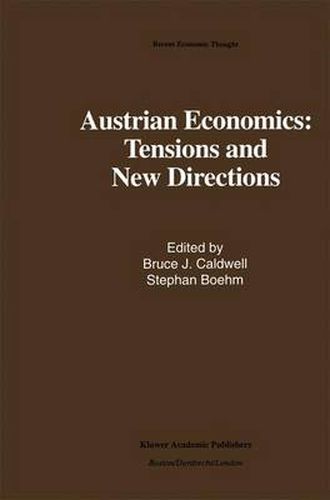Readings Newsletter
Become a Readings Member to make your shopping experience even easier.
Sign in or sign up for free!
You’re not far away from qualifying for FREE standard shipping within Australia
You’ve qualified for FREE standard shipping within Australia
The cart is loading…






This title is printed to order. This book may have been self-published. If so, we cannot guarantee the quality of the content. In the main most books will have gone through the editing process however some may not. We therefore suggest that you be aware of this before ordering this book. If in doubt check either the author or publisher’s details as we are unable to accept any returns unless they are faulty. Please contact us if you have any questions.
When we first invited the group of distinguished scholars represented here to contribute to a new volume on Austrian economics, four themes were stressed: tensions, new directions, selectivity, and criticism. In this brief introduction we will explain why those themes were emphasized and thereby shed light on our intentions and aspirations for the volume. The subtitle Tensions and New Directions indicates clearly the intent of the volume desired. If we take the 1871 publication of Carl Menger’s Principles of Economics (Grundsiitze der Volkswirthschaftslehre) as mark ing its birth, the Austrian tradition is now well over one hundred years old. The origins of the so-called Austrian Revival are more difficult to pinpoint precisely, but many would accept two decades as a reasonable estimate of its lifespan. In any case, since the mid-1970s several collections of articles written by Austrians have been published. The intent of these collections appeared to be to educate, persuade, and inspire various audiences. Uninformed readers needed to be told about the specifics of the Austrian position, to be shown how it differed from and improved upon its rivals. The initiated needed to be reassured that their commitment to a novel program was justified. As such, much of the recent Austrian literature has consisted either of exegetical accounts of the views of past figures, or of critical assessments of the positions of alternative research programs in economics from an Austrian perspective.
$9.00 standard shipping within Australia
FREE standard shipping within Australia for orders over $100.00
Express & International shipping calculated at checkout
This title is printed to order. This book may have been self-published. If so, we cannot guarantee the quality of the content. In the main most books will have gone through the editing process however some may not. We therefore suggest that you be aware of this before ordering this book. If in doubt check either the author or publisher’s details as we are unable to accept any returns unless they are faulty. Please contact us if you have any questions.
When we first invited the group of distinguished scholars represented here to contribute to a new volume on Austrian economics, four themes were stressed: tensions, new directions, selectivity, and criticism. In this brief introduction we will explain why those themes were emphasized and thereby shed light on our intentions and aspirations for the volume. The subtitle Tensions and New Directions indicates clearly the intent of the volume desired. If we take the 1871 publication of Carl Menger’s Principles of Economics (Grundsiitze der Volkswirthschaftslehre) as mark ing its birth, the Austrian tradition is now well over one hundred years old. The origins of the so-called Austrian Revival are more difficult to pinpoint precisely, but many would accept two decades as a reasonable estimate of its lifespan. In any case, since the mid-1970s several collections of articles written by Austrians have been published. The intent of these collections appeared to be to educate, persuade, and inspire various audiences. Uninformed readers needed to be told about the specifics of the Austrian position, to be shown how it differed from and improved upon its rivals. The initiated needed to be reassured that their commitment to a novel program was justified. As such, much of the recent Austrian literature has consisted either of exegetical accounts of the views of past figures, or of critical assessments of the positions of alternative research programs in economics from an Austrian perspective.